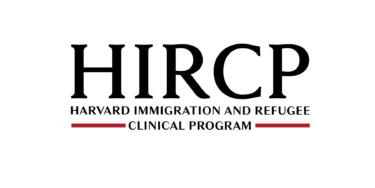March is Social Work Month. We would like to take this opportunity to highlight all that our social work team does to support our clients at the Harvard Immigration and Refugee Clinical Program.
In 2013, our Program hired Clinical Social Worker Liala Buoniconti for a part-time position to support clients at the Immigration and Refugee Advocacy Clinic. Liala’s work quickly expanded and now all clients at the Program, including the Crimmigration Clinic, Harvard Representation Initiative, and HLS Immigration Project, have access to free social work services. With the help of a team of social work interns, Liala assists clients with a variety of concerns, including emotional support, health insurance problems, financial concerns, food insecurity, and other issues related to immigration stressors.
The social work team plays a critical role in helping connect clients to necessary resources. Recently, a Crimmigration Clinic client was in family court facing an old restraining order that prohibited her from visiting her son. In order to lift the restraining order, the client needed a psychological evaluation; however, because the state she lived in did not offer universal health care access, it was difficult and expensive to find a psychologist. After finding out about this challenge, social work intern Hannah Oettgen stepped in to help. Clinical Instructor Cindy Zapata, who represents the client, described Hannah as a “tenacious and proactive” advocate who spent hours searching for resources and calling psychologists. Thanks to Hannah’s determination, she was eventually able to find a psychologist who offered a pro-bono evaluation, and the client was eventually able to reunite with her son.
Not only does the social work team help connect clients to resources, but they also offer invaluable emotional support. Cindy shared a story of a Immigration and Refugee Advocacy Clinic client of five years who, because of her limited literacy, was feeling overwhelmed by the many letters and paperwork she received in the mail each week. To help her manage this stress, Liala offered to sit down with her and go through the mail to figure out what was important and what she could ignore. Cindy said that having Liala help with such seemingly simple “immediate needs of life” is essential for clients, especially when many immigration cases take years to resolve.
The social work team continually adapts to new challenges as they come up. For example, because of pending litigation in Ramos et al v. Nielsen, individuals with TPS from certain countries have faced challenges renewing their drivers licenses at RMVs. Harvard Representation Initiative attorney Mariam Liberles represents a number of clients who were denied new licenses because of misunderstandings about their immigration status. She described how Liala helped her clients navigate this frustrating situation by contacting the local RMV liaison and showing the liaison the documentation, which proved these clients were eligible for new state licenses. Because of Liala’s advocacy, numerous clients now have the drivers licenses they were legally entitled to and are able to travel domestically without fear.
In addition to providing services to Program clients, Liala also works closely with clinical students, staff, faculty, and clients to ensure that the Program’s approach is holistic and trauma-sensitive. She co-teaches a cutting-edge course on trauma, refugees, and the law with Program Director Sabi Ardalan, which allows students the opportunity to engage with critical issues at the intersection of trauma and refugee law with some of the foremost experts in the field. Sabi expressed immense gratitude for Liala’s role in the course and highlighted how Liala “supports students in reflecting on the practices necessary to allow them to continue to pursue this work in the long term.” Liala also assists and leads a number of trainings each semester on topics such as trauma-sensitive interviewing practices, working with interpreters, cross-cultural representation, secondary trauma, and building resilience. Asylum representation often involves asking clients from around the world to recount some of the most difficult and painful moments in their lives. Through Liala’s support and training, students and attorneys alike are better equipped to navigate those conversations using a trauma-sensitive approach.
Our Program is incredibly fortunate to have such a caring and dedicated social work team. We thank Liala, Hannah, and all the past social interns who have supported our clients over the years.
